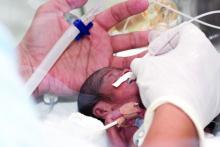For infants with trisomy 13 or trisomy 18, congenital heart surgery is associated with a significant decrease in in-hospital mortality, according to results of a large, retrospective, multicenter cohort study.
In-hospital mortality was 45% lower in trisomy 13 patients (P = .003) and 64% lower in trisomy 18 patients (P less than.001) who underwent surgery, data show (Pediatrics 140(5); 2017. doi: https://doi.org/10.1542/peds.2017-0772).
“These results suggest congenital heart surgery may be beneficial in select cases,” wrote Katherine A. Kosiv, MD, Department of Pediatrics, University of Arkansas for Medical Sciences, Little Rock, and her colleagues.The study, based on records from the 44 participating children’s hospitals represented in the Pediatric Health Information System (PHIS) database, included 1,668 newborns with trisomy 13 or 18 who were admitted within 14 days of birth. Median age at admission was less than 1 day for both groups.
Congenital heart disease was present in 925 out of 1,020 infants with trisomy 18 (91%) and 555 out of 648 with trisomy 13 (86%), the report stated.
For those infants with congenital heart disease, overall mortality was highest during the first hospital admission (63%), investigators wrote. However, for those undergoing congenital heart surgery, multivariate analysis showed decreased in-hospital mortality vs. those who had no surgery for both the trisomy 13 (30% vs. 55%, respectively, P = .003) and the trisomy 18 groups (16% vs. 44%, P less than .001).
This is not only the largest-ever study of trisomy 13 and 18 ever reported, according to the investigators, but also the first to show that higher weight, female sex, and older age at admission are associated with improved survival following congenital heart surgery among these patients. Multiple logistic regression analysis showed significant effects of these risk factors on mortality for both the trisomy 13 and 18 infant subsets, according to Dr. Kosiv and her colleagues.
These findings come at a time when many centers elect not to perform congenital heart surgery in trisomy 13 and 18 patients, the investigators wrote, noting that management is typically limited to medical strategies due to the “markedly short life expectancy” and grave prognosis associated with the condition.
Mortality was markedly decreased, but still considerably higher than what would be expected for congenital heart surgery in the general population, which is an important consideration for families and practitioners who are considering the procedure, investigators said in their report.
Nevertheless, the present findings suggest that “CHS may not be futile, at least not in the short-term, in patients with T13 and T18,” Dr. Kosiv and colleagues wrote. “Additionally, these results suggest that CHS may allow families to be able to take their children home and avoid [them] dying in the hospital.”

